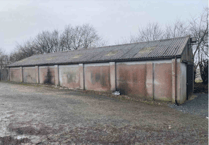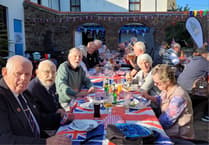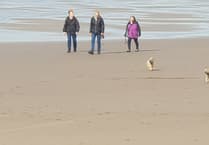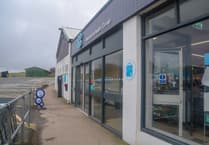BUDE Refugee Support Group held one of its last meetings before the arrival of a refugee family on Friday.
St Olaf’s church hall, Poughill, was packed with approximately just under 30 people and members of the support group on Friday, May 19. This meeting was to be one of the last before a Syrian refugee family arrives in Bude next month, and two representatives from the organisation, R J Working (Restorative Justice) were invited to come along to discuss ways of how to overcome hatred and racism.
The meeting began with a welcome from chair, Mary Whibley, who asked Rosemary Lee to update the group on collections and donations. Rosemary said that she has three large donations that are packed and ready to go to Wadebridge. She also said that she recently went to Plymouth to help with the load to go to Calais, and added that Northern France is a mess, due to the main camp — known as the ‘jungle’ — having been destroyed, leaving people scattered across the rural areas of France.
Mary then reported that interpreters, teachers of English as a second language (TESOL) and befrienders have also been contacted, and the support team is now in place.
Ellie Stacey, vice-chair, also reported that she had paid a visit to Lambeth Palace, where she had taken part in a conference with action groups such as Refugee Action and Citizens UK, who have been ‘driving community sponsorship’, of which Bude Refugee Support Group used to raise money for the first family. She said that there has been three refugee families in the UK that have settled through the community sponsorship scheme, and added: “The energy at the event was about moving forward; that we need to do more to help refugees, but that community sponsorship is very much the way forward.”
Mary said that at first, she thought the Home Office did not want to support the group to go ahead with their aims, but has now seen a positive light at the end of the tunnel.
Treasurer, Joan Fennell, reported on their finances, announcing that there is approximately £4,000 in their second account, excluding money from their PayPal account, to contribute to the £15,000 to resettle a second family in Bude.
Following this, Leslie Chandler and Deborah Mitchell from R J Working, Truro, introduced themselves.
R J Working is a restoration justice organisation, of which Leslie and Deborah were two of the founding members. Deborah, a former probation officer, was described as a ‘shining light’ in the process of R J Working’s establishment, and was concerned with the way the justice system worked at the time. Leslie has a background in teaching, and both are Quakers, ‘waging peace’ on society.
Addressing the support group, Leslie said: “I’ve just been sat here, listening to what you’ve achieved, and it’s awesome — it’s quite remarkable.”
She added that the work the support group has been doing is something that is unheard of in many parts of the country, and that the Bude group have ‘started a trend’ amongst other groups wanting to take action and help those in need.
Speaking about the work R J Working does, Leslie said: “It’s about getting the different sides of a conflict together to see if the harm that has rippled can be dealt with.”
R J Working has introduced an anti-bullying campaign to many Cornish schools, in an aim to encourage ‘resilience in young people to deal with conflict situations’. The family that is due to arrive in Bude has three young children, who will need to register into a local school. Therefore, support is needed to ensure the children are settled in as comfortably as possible, as well as making their classmates aware of the situation and how to behave.
Deborah addressed the group, saying: “I have so much admiration for your work; it’s so inspirational — thank you.”
She went on to say that the work they do in schools revolves around an ‘accumulation of small things that are painful’, and that there has been a severe increase in hate crime since the European referendum in 2016, with Devon and Cornwall being one of the highest areas in the country for racism.
She said: “Our interest is harm and how we can repair harm. Everyone’s different, of course, and it’s all about celebrating that in this — but we have to accept that many people’s opinions will be different from our own.
“I hope this work will one day become ‘normal’ in England and Wales.”
One member of the support group, who has worked on the Racial Equality Council for some time, explained that many of those who suffer from ‘harm’ may not say anything about the ‘little, subtle things’ that people do, such as rudeness in a shop or not wanting to touch hands with that individual.
Another lady, a teacher, thought it may be down to education and what is portrayed to the community about Syria, refugees and their situations. She referred to some ‘uneducated comments’ she has experienced from parents of young children. She said: “It sounds cliché, but it’s all down to education.”
The group then said that as a whole, Bude is not subject to many different religions or cultures, although open to it, and that children in schools in the area may not have met someone from a different ethnic background before, so support and encouragement would have to be provided to prevent singling-out, discrimination and the idea of the new children being ‘different’.
One member said: “The kids will be going to school, but may have to go to other schools to play sports, and the other schools may not be aware of the situation.”
Deborah said that ‘each school is unique and that must be respected’, but that the correct support and resources should be provided to educate the children on a situation like Bude’s.
In R J Working’s scheme, they look to introduce the ‘three R’s’ to schoolchildren — relationships, respect and responsibility. Deborah said that children tend to pass on the blame, so teaching young people to accept responsibility for whatever they have done, is vital, and that blame ‘can be shared’.
Mary told the meeting: “Learning English is the prime thing for the family, but in terms of community — this is the prime thing.”
Deborah agreed, adding: “Lots of people believe in time out for young people, after they have done something bad. But actually, we should be saying, come closer and look what you did; come and get involved.”
Deborah and Leslie then demonstrated their presentation to the meeting, which explained that restorative working is ‘all about communication’. They also introduced their balance model, which seeks benefits for all parties involved in a situation of conflict.
The meeting heard that different forms of harm can have a great impact on anyone’s life — particularly young people — leading to anxiety and a lack of confidence.
Deborah explained that harm that is not personal — such as someone taking something of an individual’s, leading to the argument of being at the ‘wrong place at the wrong time’ — can normally be forgiven and forgotten. However, she said: “Harm that targets someone’s identity is very personal, and the accountability is very relevant.
“When people are hurt and victimised, they get a changing relationship with harm.”
Leslie added: “It’s about giving everybody the opportunity to take some responsibility in the situation.”
The meeting was then shown a short film of a speaker from Canada, who had two very different stories to tell.
The first was the tale of when she was a little girl. Her father had one request for his family, that they do not touch or use his beard-trimming scissors. One day, when set an art project, the woman was so intrigued, she decided to take her father’s scissors from the bathroom, and proceeded to cut through paper, glue and staples, damaging the scissors. Out of guilt, she put them back where she had found them.
Her father later asked her if she had used his scissors, after struggling to trim his beard with the damaged scissors. She lied, and said she had not, and her father told her he was very disappointed in her, leading to her to finally admit to what she had done. The incident was then forgotten.
However, years later, with a family and husband of her own, the woman explained that after a New Years’ Eve party, her husband went to collect a friend from another party, where things had got out of hand. She received a call that her husband was in hospital, and the doctors were trying to save his life. He had received a head injury from being kicked over and over in the head. Her husband died, and she was later given the opportunity to meet his killer when he was arrested. She realised he had had a tough life, losing his friend, turning to drink, and had lost control. Instead of lashing out at him, she gave him a hug and later helped him to get his life back on track through restorative practice.
Bearing in mind these different situations of conflict, the meeting was then asked to get in groups to discuss situations where they had experienced a situation of conflict and explain how they had overcome them.
One girl said: “I think it’s about rhetorical questions — would you react in this way, if put in the victim’s situation? It’s about humanity.”
One lady said that if someone had hurt her, she would try and pretend it hadn’t happened, whilst another said she would use humour, thinking of something funny when seeing someone she didn’t like, and ‘working on yourself’.
Another gentleman said: “Forgiveness is key; it’s better to lose an argument that to lose a friend.”
Other members of the group explained that if someone does something harmful, they would rather not associate themselves with that person, and that forgiving them is out of the question.
Leslie agreed, saying: “Forgiveness is very difficult sometimes; it is a challenge.”
Deborah said: “There’s hostility in the wider world — hopefully not in Bude — but it’s about thinking scenarios through.
“A restorative approach is about challenging and accepting responsibility.”
The group were commended for their work in achieving Home Office approval for welcoming a refugee family to Bude. Now, the group is working towards fundraising for a second family to arrive. Mary said: “We’ve got to get the money together and show everyone what a great group we are and what we can do; then we can put in for our second family, which has always been our aim.”
Following the meeting, Mary contacted the Post to express Bude Refugee Support Group’s gratitude to everyone who has donated and provided support, as they are ‘coming to an end of a big thing now, for the first family anyway’. She said: “Bude Refugee Support Group would like to express their heartfelt gratitude to everyone who has helped us by donating furniture, household goods, furnishings, the many people who are actually sponsoring the family by monthly payments, and local businesses such as Woolacotts and Mirchi.
“The generosity and support is overwhelming. It has enabled us to give sanctuary to this young family, who have endured unimaginable hardship and fear for more than six years. They can now start to rebuild their lives here in this wonderful community. Thank you!”




Comments
This article has no comments yet. Be the first to leave a comment.